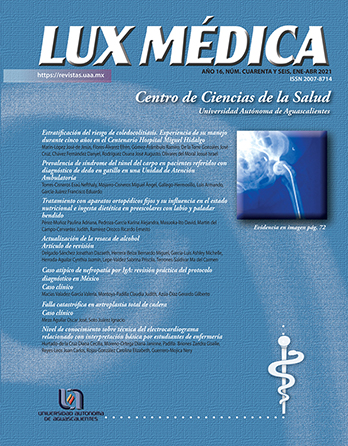Alcohol hangover update
DOI:
https://doi.org/10.33064/46lm20213061Keywords:
hangover, alcohol hangover (AH), veisalgiaAbstract
Introduction: Alcohol hangover refers to the combination of negative mental and physical symptoms experienced after a single episode of alcohol use when the blood alcohol concentration approaches zero. Hangovers are generally not considered harmful and have received little scientific attention despite being the most common alcoholrelated morbidity. Objective: To review the concept of a hangover caused by alcohol con-sumption, its pathophysiology, and treatment. Methods: A literature search of the online databases PubMed, EBSCO, BVS, Cochrane, UAA search engine, and Epistemoikos was carried out using the following MeSH terms in Spanish and English: “veisalgia”, “alcoholinduced hangover” and “alcohol hangover.” Results: Hangover in social drinkers need to be differentiated from withdrawal symptoms experienced by people with alcohol use disorders (alcoholism), which not only involves binge drinking but also maintains a basal level of constant and continuous alcohol consumption for several days or even more. Conclusions: Critically, all hangover models must be based on the current alcohol hangover definition. In studies in human subjects, researchers need to be objective in the study design that should be used considering its advantages and limitations. LUXMÉDICA AÑO 16, NÚMERO 46, ENERO-ABRIL 2021, PP.29-51.
Downloads
Downloads
Published
How to Cite
Issue
Section
License
La revista Lux Médica está bajo una licencia de Creative Commons Reconocimiento-NoComercial-Compartir Igual 4.0 Internacional.












